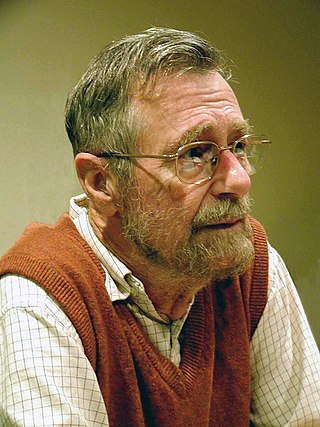The Association for Computing Machinery (ACM) is a US-based international learned society for computing. It was founded in 1947 and is the world's largest scientific and educational computing society. The ACM is a non-profit professional membership group, reporting nearly 110,000 student and professional members as of 2022. Its headquarters are in New York City.

Edsger Wybe Dijkstra was a Dutch computer scientist, programmer, software engineer, mathematician, and science essayist.
Peter Pin-Shan Chen is a Taiwanese-American computer scientist. He is a (retired) distinguished career scientist and faculty member at Carnegie Mellon University and Distinguished Chair Professor Emeritus at LSU. He is known for the development of the entity–relationship model in 1976.
The Paris Kanellakis Theory and Practice Award is granted yearly by the Association for Computing Machinery (ACM) to honor "specific theoretical accomplishments that have had a significant and demonstrable effect on the practice of computing". It was instituted in 1996, in memory of Paris C. Kanellakis, a computer scientist who died with his immediate family in an airplane crash in South America in 1995. The award is accompanied by a prize of $10,000 and is endowed by contributions from Kanellakis's parents, with additional financial support provided by four ACM Special Interest Groups, the ACM SIG Projects Fund, and individual contributions.

Paris Christos Kanellakis was a Greek American computer scientist.
ACM SIGACT or SIGACT is the Association for Computing Machinery Special Interest Group on Algorithms and Computation Theory, whose purpose is support of research in theoretical computer science. It was founded in 1968 by Patrick C. Fischer.

The Donald E. Knuth Prize is a prize for outstanding contributions to the foundations of computer science, named after the American computer scientist Donald E. Knuth.

Patrick M. Hanrahan is an American computer graphics researcher, the Canon USA Professor of Computer Science and Electrical Engineering in the Computer Graphics Laboratory at Stanford University. His research focuses on rendering algorithms, graphics processing units, as well as scientific illustration and visualization. He has received numerous awards, including the 2019 Turing Award.
Murray Campbell is a Canadian computer scientist known for being part of the team that created Deep Blue; the first computer to defeat a world chess champion.

James F. O'Brien is a computer graphics researcher and professor of computer science and electrical engineering at the University of California, Berkeley. He is also co-founder and chief science officer at Avametric, a company developing software for virtual clothing try on. In 2015, he received an award for Scientific and Technical Achievement from the Academy of Motion Pictures Arts and Sciences.
SIGDOC is the Special Interest Group on Design of Communication of the Association for Computing Machinery (ACM), an international learned society for computing. ACM SIGDOC was founded in 1975 by Joseph "Joe" T. Rigo.
Eugene Leighton (Gene) Lawler was an American computer scientist and a professor of computer science at the University of California, Berkeley.
Johannes Schöning is a computer scientist best known for his research in human-computer interaction, geoinformatics and mobile computing and was awarded with the ACM Eugene L. Lawler Award for humanitarian contributions within Computer Science and Informatics in 2012. He is a professor at the University of Bremen in Germany. He owns a "Lichtenberg-Professur" of the Volkswagen Foundation.

Yoshua Bengio is a Canadian computer scientist, most noted for his work on artificial neural networks and deep learning. He is a professor at the Department of Computer Science and Operations Research at the Université de Montréal and scientific director of the Montreal Institute for Learning Algorithms (MILA).
Venkata Narayana Padmanabhan is a computer scientist and principal researcher at Microsoft Research India. He is known for his research in networked and mobile systems. He is an elected fellow of the Indian National Academy of Engineering, Institute of Electrical and Electronics Engineers and the Association for Computing Machinery. The Council of Scientific and Industrial Research, the apex agency of the Government of India for scientific research, awarded him the Shanti Swarup Bhatnagar Prize for Science and Technology, one of the highest Indian science awards for his contributions to Engineering Sciences in 2016.

ACM SIGHPC is the Association for Computing Machinery's Special Interest Group on High Performance Computing, an international community of students, faculty, researchers, and practitioners working on research and in professional practice related to supercomputing, high-end computers, and cluster computing. The organization co-sponsors international conferences related to high performance and scientific computing, including: SC, the International Conference for High Performance Computing, Networking, Storage and Analysis; the Platform for Advanced Scientific Computing (PASC) Conference; Practice and Experience in Advanced Research Computing (PEARC); and PPoPP, the Symposium on Principles and Practice of Parallel Programming.
Sanjay Ghemawat is an Indian American computer scientist and software engineer. He is currently a Senior Fellow at Google in the Systems Infrastructure Group. Ghemawat's work at Google, much of it in close collaboration with Jeff Dean, has included big data processing model MapReduce, the Google File System, and databases Bigtable and Spanner. Wired have described him as one of the "most important software engineers of the internet age".
Sharon Oviatt is an internationally recognized computer scientist, professor and researcher known for her work in the field of human–computer interaction on human-centered multimodal interface design and evaluation.






